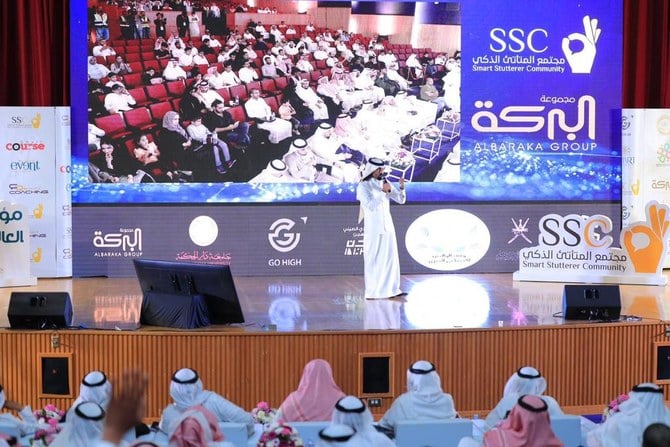.Speakers show success of local treatment program
.350,000 in Saudi, 80m globally still need help
The Smart Stutter Community here have lauded their current collaboration with local bodies but will be seeking to strengthen ties with the Saudi ministries of health and education to help 350,000 people who have the speech disorder in the Kingdom.
As part of International Stuttering Awareness Day, held every Oct. 22, the SSC hosted a conference on Saturday at Effat University’s Prince Bandar bin Sultan Hall, where 10 people took the stage to show how fluent and self-assured they have become after completing the organization’s program.
There are 80 million people who have the disfluency disorder worldwide, who often have to contend with discrimination.
The event was attended by more than 500 people from inside and outside the Kingdom. For nearly four hours, the participants inspired the audience with their stories of how they became more fluent speakers.
Speaking to Arab News, Dr. Abdullah Kreshan, general supervisor of the SSC project, said that stuttering can be treated. “Stutterers now have many solutions to get rid of their problem … People in our society have long believed the speech disorder could be impossible to treat,” Kreshan said.
He added that over the past three years, more than 600 male and female citizens and residents have completed the SSC’s programs and are now more fluent and articulate speakers.
Kreshan said that further success can be achieved by ensuring greater collaboration between civil society organizations and government bodies. “This incorporation is needed to achieve one of the Saudi Vision’s key pillars — a vibrant society capable of creating a prosperous economy and building an ambitious nation.”
The SSC’s Director of Programs Ahmed Al-Muhanna added that the Kingdom has made great strides in treating people who have the disorder. He said that stuttering or “stammering” is a speech disorder where people find it difficult to express themselves in words. “The condition can even be worse when the person is excited, tired or under pressure.”
He added that stuttering starts between the ages of 1 and 6, when all children learn to speak. This is called the subconscious mindset. In later life, Al-Muhanna said, unpleasant experiences and shocks could disrupt breathing and trigger a stutter.
Kreshan said the SSC is the first organization of its kind in the GCC region. “We have proved that there is a solution to stuttering. Some 600 people from Saudi Arabia, Gulf countries and the Arab world have completed the programs designed to help them overcome their speech disorders. We are nowadays offering qualitative programs. You have seen through the videos how the stutterers were when they came to us and how they are now.”
He said the SSC had signed partnership agreements with several government entities. “Last April, our project won the Jeddah Creativity Award after being arbitrated by more than 50 academicians. We are also in contact with the Ministry of Education to give us the green light to hold school awareness campaigns. Moreover, we receive donations from charity societies and companies through their social responsibility programs,” he said.
Kreshan said the SSC wants to ensure it has a national footprint. “It would be great if we could cooperate with more concerned agencies and entities. This way, we can go to the furthest (extent) possible. We have 350,000 stutterers of both genders in the society, and they are in dire need of our help,” he said.
Kreshan said there are many misconceptions about stuttering. “Some may believe that stuttering is impossible to treat, and that is not true at all. Some others may think that there are no stuttering treatment centers in the Arab world, and they spend a lot of money on their travels and search for a solution for themselves or for a stuttering family member,” he said.
Kreshan said the SSC’s five-day program is meant to be a starting point for people who are disfluent. “After five days of intensive training, a stutterer can benefit from 70 to 90 percent of the training program. After that, the remaining 10 to 30 percent can be treated over time, with more practice.” He said the program has a small cost, which is refundable if a person does not get any benefit from it.
Abdul Aziz Al-Mufairij, a 14-year-old former stutterer, was presented as an example of the SSC’s success. He was first shown speaking in a pretreatment video and then came on to the stage to speak. When he finished his presentation, Al-Mufairij’s fluency and self-assurance received a thundering ovation.
Al-Mufairij told Arab News that he started stuttering at the age of 5. “Luckily, I faced no bullying from my brothers and relatives, but I remember it later bothered me a lot when a teacher asked me to read a text in front of my schoolmates. I didn’t like it when some teachers didn’t give me enough time to read or express myself,” he said.
Al-Mufairij said he joined the SSC program four months ago and that his entire family helped him overcome his difficulty. He practiced four to five hours a day and would often speak to people out in malls and other public places to gain confidence.
On the sidelines of the event, representatives from the GCC countries signed partnerships and agreements with the SSC, with the aim to replicate its program in their countries.

